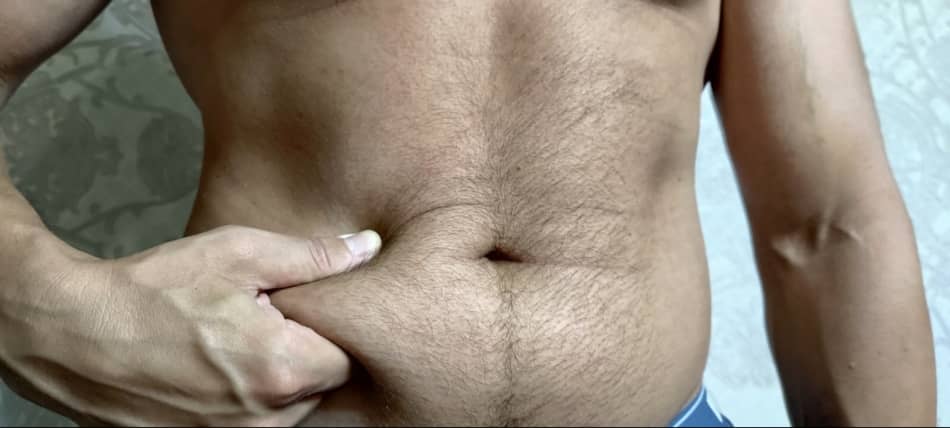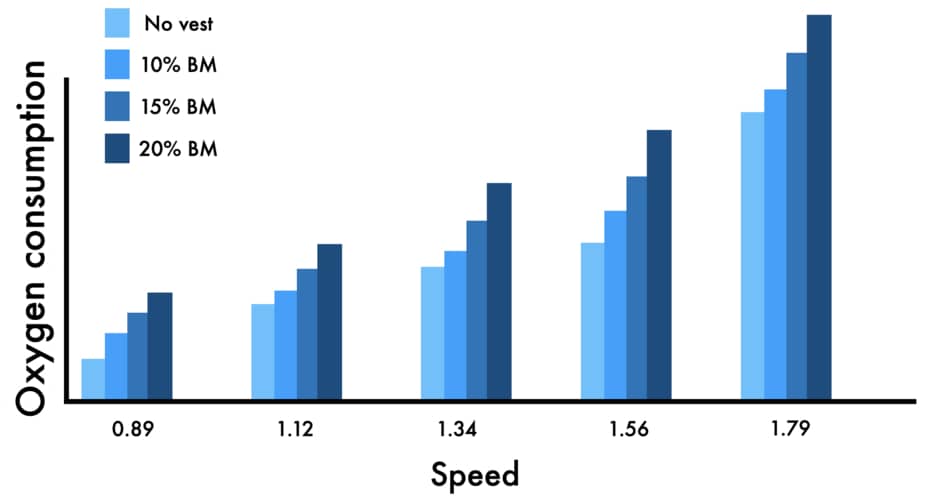Have you ever wondered why some overweight guys suck at aerobic exercises but seem to be ridiculously strong in the weight room? Today I will explain does being fat make you stronger and if having more fat help you lift more weights.

As a whole, being fat does make you stronger, but only in absolute strength. Absolute strength is the ability to produce maximum force against an external resistance, irrespective of body weight. However, studies have shown that being overweight or obese does not influence relative strength.
(I’m on the go today so I’ll keep this article quite short)
Does Fat Make You Stronger?
There is a big difference between absolute strength and relative strength.
Being fat can contribute to absolute strength, but it does not improve your relative strength.
- Absolute strength is being able to produce maximal force (lift as much weight as you can) regardless of body weight or size.
A great example of absolute strength can be seen in the powerlifting or strongman competition (these guys are massive).
There is a good reason why the world’s professional powerlifters are brutally strong, yet carry extra body fat.
Take a look at any strongman or powerlifting events and you will see overweight guys lifting tons of plates.
- These guys and gals don’t care about their aesthetics.
- They don’t train for physique or figure contests.
- They train to lift as much weight as humanly possible.
To hit the PRs and be as strong as possible they need to be in a constant calorie surplus, meaning eating more energy than the body expends. Calorie surplus provides energy that is essential for optimal muscle and strength gains.
The downside of a positive energy balance is a higher fat percentage. On the other hand, being in a calorie deficit significantly lowers the ability to improve strength.
Why does fat make you stronger?
In general, fat does make you stronger by increasing your absolute strength. Studies have shown that obese people have a higher absolute strength and power, compared to normal-weight people.
Heavier people can also generate higher power output and maximum voluntary contraction.
- Relative strength is the ability to produce maximal force (how much weight you can lift) compared to the person’s body weight.
In other words, the goal of higher relative strength is to lift as much weight as possible, while keeping the total body weight as low as possible.
For example.
- Having a low body fat and high strength is important in physically demanding professions, such as fire and rescue, law enforcement, and military operations.
- These guys need to be strong and light at the same time.
My point is that fat does not make your muscles stronger. The total body weight does.
Heavier weight does increase absolute strength, but not relative strength.
To improve relative strength you need to lift weights at the optimal load of 70-90% or one repetition maximum and stay within the 1-5RM rep range.
Does Body Fat Make You Stronger?
In general, having a higher body fat does not contribute to being physically stronger, at least not directly. Having optimal strength is the effect of training with a heavy load. However, carrying extra body fat act as a training stimulus on skeletal muscle, which can lead to increased strength.
You can think of getting stronger by carrying extra body fat just like by wearing a weighted vest.
Dr. Michael Puthoff from St. Ambrose University documented the effects of wearing a weighted vest during walking.
The study compared people carrying different vests and sizes:
- 0% of body mass (no vest)
- 10% of body mass
- 15% of body mass
- 20% of body mass
See the graph below.

Key takeaways from this study:
- Carrying extra body weight does increase oxygen consumption and relative exercise intensity.
- This leads to strength and muscle gains.
- People who wore a weighted vest as the equivalent of 20% of their body weight had the most significant results.
In other words, fat does not make you somehow stronger or lift more weight. It’s the excess weight that you carry that acts as a chronic overload stimulus on the antigravity muscles.
Adding extra body weight in the form of weighted vests is nothing new. This form of strength and conditioning is popular in sports like CrossFit.
I love to train with the weighted vest, however, I do not walk around in it for the whole day.
Adding extra weight (just like carrying extra body fat) may contribute to strength, but it can have a bad effect on your knees.
Does having more body weight make you strong? As a whole, having more body weight does make you stronger because extra body weight acts as a workout in itself. Overweight people need to produce more power to move. Higher power output can lead to strength and muscle gains.
Why Does Having More Fat Make You Stronger?
Have you ever wondered why fat people are stronger than skinny people?
One of the reasons why having more fat makes you stronger is because carrying extra weight is a workout in itself. Your body needs to constantly generate higher power and force to move the body, which provides constant mechanical tension on the muscle.
In other words, it’s not the adipose tissue that makes you stronger, but rather carrying excess body weight works as training (especially on the lower body), which indirectly contributes to strength gains.
Putting the muscle under load (mechanical overload with high resistance) increases muscle mass.
On the other hand, reducing the weight and “unloading” the muscle leads to muscle weakness (muscle atrophy). A good example is the astronaut’s training.
In the space environment, microgravity exposure leads to the loss of skeletal mass, strength, and aerobic capacity.
One study revealed that 6 months of spaceflight lead to 24% volume losses for the calf and quadriceps muscle groups.
How Does Body Weight Affect Strength?
In general, a higher body weight affects your strength because heavier people need to generate more power to be able to walk. A higher weight means more energy is required to move the mass against the resistance, which translates into higher strength.
Being fat makes your legs stronger
In general, being fat makes your legs stronger. A great example of the relationship between body weight and lower body strength can be seen in the world of cycling.
Overweight people who carry extra body fat can generate much higher power output, compared to normal-weight people.
If you have two people going the same distance with the same intensity, the heavier person will generate a much higher power output. However, this won’t last for too long because overweight people are usually deconditioned.
Why Am I Fat But Strong?
Overall, people who are fat usually need to expend more energy and generate higher force to move their bodies. Higher force production requires gigantic effort from the muscles and put them under constant work.
For example.
- Fat people can lift more weights during static lower body exercises like squats, deadlifts, or leg presses.
- However, when it comes to functional movement or endurance exercises, they struggle.
One of the guys in the gym that I know weighs over 300 pounds. He cannot go up the stairs without getting winded, but he can deadlift almost 500 lbs (5 plates on each side).
The guy is strong as a bear (especially in the lower body).
Most of his compound moves like squats, deadlifts, bench, and rows are done with a ridiculous amount of weight. However, when it comes to cardio or endurance, this guy fatigues much faster because it is more difficult to sustain this effort.
One thing to keep in mind is that a higher fat percentage is also linked with unfavorable hormonal changes in the body.
Does Body Fat Percentage Affect Strength?
In general, a higher body fat percentage does affect muscle growth and strength because it lowers testosterone levels. Studies have shown that obese men have 30% lower total testosterone levels, compared to lean men.
Plus, 40% of obese men have testosterone levels lower than 12 nmol/L, which is a lower limit reported for healthy men (Bhasin et al. 2011).
It is not a secret that testosterone improves body composition by reducing body fat mass and increasing lean body mass.
It’s the holy grail of every guy’s workout, whenever you want a saucy-looking physique or a strength of a grizzly bear. It is a fat-reducing hormone whereas fat slows down muscle growth.
According to the Mayo Clinic College of Medicine, one of the reasons why higher body fat percentages lower the strength and testosterone levels is due to the increase of pro-inflammatory cytokines (source).
You can think of inflammatory cytokines like scavengers that lower muscle mass (therefore, lower strength levels).
Inflammatory cytokines are mainly found in the body fat (adipose tissue). A number of studies have shown that “testosterone deficiency was associated with an increase in pro-inflammatory cytokines and testosterone substitution reduced pro-inflammatory cytokines” (Mohamad et al. 2019).
Having a higher body fat percentage makes you weaker because it’s associated with systemic inflammation. Chronic inflammation reduces testosterone levels. Low T levels lead to a higher fat percentage.
It’s like a vicious cycle.
Can fat be used for strength? In general, fat can be used for strength only as a source of energy, not as a strength enhancement. If someone is strong it means he has the ability to recruit the highest threshold motor units in the muscle.
Conclusion
- Gaining weight and getting fat do not equal strength.
- Fat does make you stronger because people who are overweight or obese have a greater absolute maximum muscle strength, compared to non-obese people.
- However, being fat does not improve relative strength, which takes into consideration the bodyweight-to-strength ratio.
- People who are overweight and fat are often stronger than skinny people.
- Carrying excess body fat forces the body to use higher power output to be able to move, which acts as a training stimulation on the muscle.
- The effect results in higher mechanical tension, hypertrophy, and strength gains.
